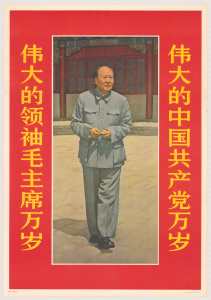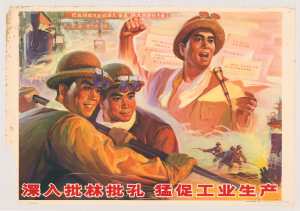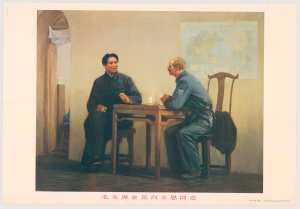Chinese Propaganda Posters
by Sean Yan
Chinese propaganda posters were a product of the Chinese Communist Party in the twentieth-century, created to glorify the efforts of the party. The posters were also intended to reinforce harmony between citizens and the government. They can usually be found in newspapers, calendars and textbooks. Artists today are inspired by these posters to capture this period in history and at the same time, to show criticism. There is a growing popularity of the propaganda poster style among designers of home decor and apparel, and this style is especially popular with the younger generations in China.
It has been more than a year since I first came to the U.S. from China. Although I was born and raised much later than when the propaganda posters were most popular, there were still many propaganda poster elements in Chinese society in the 1990s. One of the first projects I worked on after being hired at the AGS Library was the scanning of about 21 of these propaganda posters. I was surprised to see these posters, which haven’t been seen for years in China, here in Milwaukee. It feels different to see this collection in the U.S because most of what I had seen was in elementary school textbooks.
The AGS Library has 21 posters in total and here are a few examples:

*Note: “Ten thousand years” is a phrase which expresses people’s worship of an emperor in ancient China, but it also can be used as a feeling of triumph. (There is a little bit of both in my personal view, the same for the other posters shown)

The poster above shows a character in contemporary ballet called “Red Detachment of Women (红色娘子军)” which is regarded as a masterpiece in modern China.

People in the poster above are standing in front of Tian’an Men, which is a national symbol of China. The poster stands for the unity of the 56 ethnicities of the entire nation. This is a very common image that you find in offices, homes and even some local government buildings.

This poster reminds people of the “Military doctrine for the Chinese Red Army.”
The three rules are: 1. prompt obedience to orders; 2. no confiscation of people’s property; 3. turn in everything captured.
The eight points for attention are: 1. be polite when speaking; 2. be honest when buying and selling; 3. return all borrowed articles; 4. pay compensation for everything damaged; 5. do not hit or swear at others; 6. do not damage crops; 7. do not harass females; 8. do not mistreat prisoners.

This poster is very representative of the great Cultural Revolution, started in 1966 and ended by 1976, which meant to reinforce Mao’s Communism by purging remnants of capitalist and traditional elements from Chinese society. “Lin” refers to Lin Biao who was the vice president of People’s Republic of China and “Kong (孔)” refers to Confucius. Due to Mao’s political theory, he encouraged the public to criticize Confucius, Confucianism and Lin who was officially condemned as a traitor by the Communist Party after a failed coup attempt against Mao.

As a surgeon, Bethune greatly helped Eighth Route Army soldiers who had been wounded on the front line during the Second Sino-Japanese War that would earn him enduring acclaim. Dr. Bethune was greatly praised by Mao and has been included in school textbooks ever since.
You are more than welcome to leave any comments below in regards to Chinese propaganda posters or anything about China. Feel free to stop in and check out the rest of the posters and our collections at AGS Library 3rd floor, east wing of UWM Libraries.